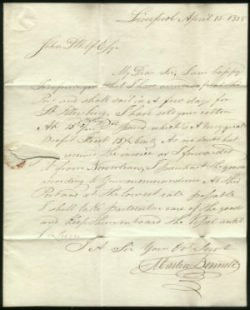![]()
Home Page
Postal History Introduction
Stampless
Covers
1846
to 1900 Issues
1901-1950
Issues
1951-2003
Issues
Cancels
&
Miscellaneous
Postal
Stationery
Post
Cards
Air
Mail
First
Day &
Event Covers
Parcel Post/Special Delivery
Registered & Official Mail
Commercial & Advertising
Revenue & Postage Due
Wildlife & Game Issues
Complete List of RI Issue
|
Stampless Covers |
||||
|
||||
|
John
D' Wolf Letter: |
||||
|
Liverpool April 10, 1825 John
D'Wolf Esq. I am Sir, your hm servant, Martin Bennett Note: I believe the captain is alluding to some special cargo in the last part of the letter as he seems to go to great lengths to not identify what the cargo is. Also there is that reference to keeping it onboard. There are two excellent books dealing with the Rhode Island slave trade, which go into much greater detail than this short article and I heartily recommend both for further reading. They are: "Off Soundings - Aspects of the Maritime History of Rhode Island" by Alexander Boyd Hawes and "The Notorious Triangle: Rhode Island and the African Slave Trade, 1700-1807" by Jay Coughtry. Sources: See Also:
The
First Rhode Island Regiment (The Black
Regiment) |

Introduction
Stampless I
Stampless II
Stampless III
Stampless IV
Stampless V
Stampless VI
Brown & Ives Letters
The Hazard Family Letters
Joseph Tillinghast
Free Franked Letters
DeWolf Family Letters
